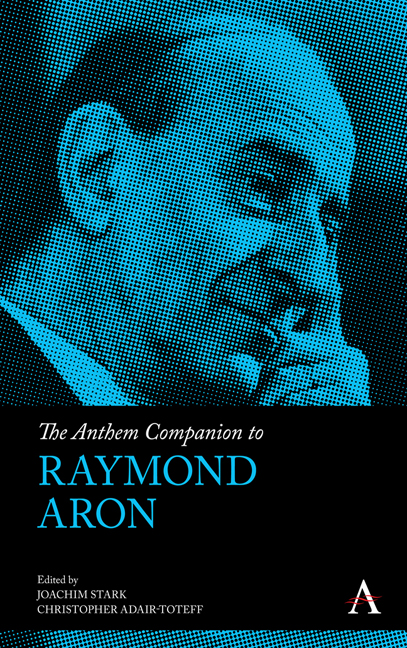Book contents
- Frontmatter
- Contents
- Acknowledgements
- Introduction: Retracing Aron’s Routes to Sociology
- Chapter One The Subject, Pluralism and Équité: Raymond Aron and Sociology
- Chapter Two Aron, Weber and Nationalism
- Chapter Three Equivocal and Inexhaustible: Aron, Marx and Marxism
- Chapter Four The Opium of the Intellectuals
- Chapter Five A New Era in the Human Adventure: Industrial Society and Economic Growth
- Chapter Six Raymond Aron: La lutte de classes
- Chapter Seven Political Philosophy Meets Political Sociology: Raymond Aron on Democracy and Totalitarianism
- Chapter Eight The Contradictions of Prometheus: Wisdom and Action after the Disillusionment of Progress
- Chapter Nine The International Problem and the Question of the Best Political Regime
- Chapter Ten War and Irrationality: Aron and Pareto
- Conclusion: Aron on Liberty
- Notes on Contributors
- Index
Chapter One - The Subject, Pluralism and Équité: Raymond Aron and Sociology
Published online by Cambridge University Press: 22 February 2022
- Frontmatter
- Contents
- Acknowledgements
- Introduction: Retracing Aron’s Routes to Sociology
- Chapter One The Subject, Pluralism and Équité: Raymond Aron and Sociology
- Chapter Two Aron, Weber and Nationalism
- Chapter Three Equivocal and Inexhaustible: Aron, Marx and Marxism
- Chapter Four The Opium of the Intellectuals
- Chapter Five A New Era in the Human Adventure: Industrial Society and Economic Growth
- Chapter Six Raymond Aron: La lutte de classes
- Chapter Seven Political Philosophy Meets Political Sociology: Raymond Aron on Democracy and Totalitarianism
- Chapter Eight The Contradictions of Prometheus: Wisdom and Action after the Disillusionment of Progress
- Chapter Nine The International Problem and the Question of the Best Political Regime
- Chapter Ten War and Irrationality: Aron and Pareto
- Conclusion: Aron on Liberty
- Notes on Contributors
- Index
Summary
Aron's journey to sociology began with philosophy, metaphysics and the theory of knowledge. In his young years, Aron was strongly drawn to a thorough study of the works of Aristotle, Descartes and Kant. By contrast, his reading of Durkheim and Comte, who likewise featured on the philosophy curriculum at the École Normale Supérieure (ENS), where he studied in the 1920s, gave him—at least initially—little impetus to make closer acquaintance with the science of society. This apparent lack of interest endured until 1929, when Aron responded to the global economic crisis by turning to Karl Marx for explanations of the crash and the weakness that had befallen Europe's democratic, pluralist governments (Mesure 2015; Nelson 2019, 113–25).
Aron soon found Marx's prophecy that capitalism would eventually eat itself to be less than convincing. It was his reading of Max Weber that prompted his turn to sociology. The foci of the emphatic impression made on him by these works lay in his engagement with Weber's concept of understanding (Verstehen) the subjectively defined meaning of action in society and his ultimately pluralistic perspective on that society. Aron's distinctive brand of this pluralism in sociology remained consistently undergirded by an approach that drew on philosophy and the theory of knowledge and, in the final analysis, took a critical attitude toward ideology. Further, his focus was always the big picture of societal developments, such as class structures, social strata and the shape of intellectual, economic and political elites. It was a conscious decision on Aron's part to devote himself to this macrosociological field of research, albeit a decision taken in the face of the profound economic, social and political ruptures he experienced during his lifetime, including the global financial crash, the rise of National Socialism, the Second World War, Communism and the Cold War. Aron was not involved in any empirical microsociological studies of specific objects or issues during the 1930s (Mazon 1985, 331ff.; Tournès 2008, 1394ff.), with the possible exception of a case study, drawn up using empirical data, of the Nazis’ seizure of power in Germany (Aron [1936] 1985, 1993).
Aron embarked upon his life's work as a sociologist at the ENS and subsequently, from 1934 onward, in his role at its attached institute Centre de Documentation Sociale (CDS), surrounded by former disciples of Durkheim.
- Type
- Chapter
- Information
- The Anthem Companion to Raymond Aron , pp. 19 - 38Publisher: Anthem PressPrint publication year: 2021

